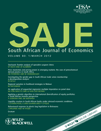
SOUTH AFRICAN JOURNAL OF ECONOMICS
Scope & Guideline
Championing excellence in economic scholarship.
Introduction
Aims and Scopes
- Applied Economic Research:
The journal emphasizes empirical research that applies economic theories to real-world issues, particularly those relevant to South Africa and Sub-Saharan Africa. - Policy Analysis and Recommendations:
A core focus is on analyzing economic policies and their implications, providing insights that can guide policymakers in addressing economic challenges. - Interdisciplinary Approaches:
The journal encourages interdisciplinary research, integrating perspectives from sociology, political science, and environmental studies to enrich economic analysis. - Regional Economic Studies:
Research that evaluates economic phenomena specific to regions within Africa, including the impact of socio-economic factors on development and growth. - Quantitative and Qualitative Methodologies:
The journal publishes studies utilizing both quantitative methods, such as econometric modeling, and qualitative approaches, allowing for a comprehensive understanding of economic issues.
Trending and Emerging
- Digital Economy and Technology Adoption:
Recent publications highlight the significance of digital technologies in economic growth, particularly in manufacturing sectors, demonstrating an increasing interest in how technology influences productivity and competitiveness. - Social Protection and Welfare Economics:
There is a growing focus on social protection mechanisms, especially in the context of the COVID-19 pandemic, emphasizing the importance of welfare policies in promoting economic resilience. - Environmental Economics and Climate Change:
Research addressing the economic impacts of climate change and environmental sustainability has gained traction, reflecting a broader global concern for environmental issues and their economic implications. - Inequality and Poverty Dynamics:
An emerging trend is the detailed analysis of inequality and poverty, exploring multidimensional aspects and their interconnections with economic policies and labor markets. - Health Economics and Labor Market Participation:
The intersection of health issues, such as the impacts of diseases like tuberculosis and COVID-19 on labor market dynamics, is increasingly becoming a focal point for research, highlighting the socio-economic implications of health crises.
Declining or Waning
- Traditional Macroeconomic Indicators:
There appears to be a waning focus on conventional macroeconomic indicators such as GDP growth rates, as researchers increasingly prioritize complex socio-economic interactions and their impacts. - Agricultural Economics:
Research specifically centered on agricultural economics seems to be declining, possibly due to the broader focus on urban economic issues and industrialization. - Theoretical Economic Models:
There is a noticeable shift away from purely theoretical economic modeling towards more empirical research that emphasizes practical applications and real-world data. - International Trade Theory:
Interest in traditional international trade theory has decreased, with a move towards understanding global value chains and their implications for local economies. - Inflation Studies:
While inflation remains a critical economic issue, the frequency of studies focusing solely on inflation metrics and their impacts appears to be diminishing.
Similar Journals
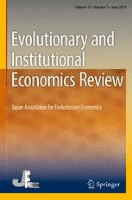
Evolutionary and Institutional Economics Review
Unraveling the Complexities of Economic InstitutionsThe Evolutionary and Institutional Economics Review, published by SPRINGER HEIDELBERG, serves as a pivotal platform for disseminating cutting-edge research in the dynamic fields of evolutionary and institutional economics. With its ISSN 1349-4961 and E-ISSN 2188-2096, this journal emphasizes interdisciplinary approaches that explore how economic institutions evolve and impact economic performance and social welfare. Although currently not open access, it provides invaluable insights for researchers, professionals, and students keen on understanding the intricate relationships between economic systems and institutional frameworks. The journal aims to foster academic discourse that bridges theoretical perspectives and practical implications, enhancing the scholarly conversation within the economic community. Its headquarters in Heidelberg, Germany, positions it at the heart of European economic research, making it an essential resource for anyone interested in the evolution of economic thought.
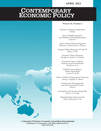
CONTEMPORARY ECONOMIC POLICY
Driving Conversations in Economics and Public PolicyCONTEMPORARY ECONOMIC POLICY is an esteemed journal dedicated to advancing the discourse in the realms of economics, public administration, and management. Published by Wiley, this influential journal has been contributing to the field since 1982 and continues to provide valuable insights and research findings through its rigorous peer-review process. With a commendable impact factor placing it in the Q2 category across multiple fields—including Business, Management, and Accounting, as well as Economics and Econometrics—CONTEMPORARY ECONOMIC POLICY is positioned as a vital resource for scholars, practitioners, and students alike. The journal not only fosters academic collaboration but also addresses pressing economic policies and practices impacting the global landscape. Researchers and professionals can benefit from a subscription-based access model, ensuring they remain at the forefront of current economic debates and innovations.
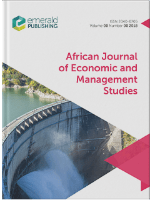
African Journal of Economic and Management Studies
Advancing Economic Insights for Africa's FutureThe African Journal of Economic and Management Studies, published by EMERALD GROUP PUBLISHING LTD, is a premier academic platform dedicated to advancing knowledge in the fields of economics, management, and business studies, focusing on trends and issues pertinent to the African context. With an ISSN of 2040-0705 and an E-ISSN of 2040-0713, this journal has established itself as a critical resource, achieving a commendable Q2 ranking in both the Business, Management and Accounting and Economics, Econometrics and Finance categories for 2023. By offering a blend of theoretical insight and empirical research, the journal facilitates the discourse surrounding effective economic policies and management practices, essential for students, researchers, and professionals alike. As it continues to expand its impact from its base in the United Kingdom and runs from 2010 to 2024, the African Journal of Economic and Management Studies remains committed to contributing to the academic community through rigorous peer-reviewed articles and innovative studies that address the unique challenges and opportunities within the African economy.

Economics and Business Review
Empowering research, shaping futures in economics and business.Economics and Business Review is a prominent open-access journal dedicated to advancing knowledge in the fields of business, economics, and finance. Published by SCIENDO, this journal aims to provide a platform for innovative research and critical discourse, fostering collaboration among scholars, practitioners, and students alike. With its ISSN 2392-1641 and E-ISSN 2450-0097, Economics and Business Review has established itself within the academic community since becoming open access in 2018. Based in Poland, the journal covers a wide range of topics within its converged years (2019-2024) and has achieved a Q3 category ranking in various disciplines, including Business and International Management, Economics and Econometrics, and Finance as of 2023. These accolades underscore its growing influence, as evidenced by its Scopus rankings, which place it among the notable contributors in these domains. The journal's commitment to accessibility and scholarly rigor ensures it is a vital resource for researchers and professionals striving to remain at the forefront of economic and business trends.
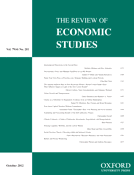
REVIEW OF ECONOMIC STUDIES
Shaping Economic Discourse with Empirical InsightsREVIEW OF ECONOMIC STUDIES, published by OXFORD UNIVERSITY PRESS, stands as a premier academic journal in the field of Economics and Econometrics. Established in 1933, it has maintained a strong tradition of scholarly excellence, evidenced by its prestigious Q1 category ranking and its position in the top 93rd percentile among its peers, with a remarkable Scopus rank of #49 out of 716 related journals. This reputable journal aims to publish high-quality research that advances theoretical understanding and empirical knowledge in economics, fostering a dynamic dialogue among researchers, professionals, and students alike. Despite not being an open access journal, the REVIEW OF ECONOMIC STUDIES provides invaluable insights and impactful findings that shape the discourse in the economics community, making it a vital resource for those engaging in rigorous economic analysis and policy-making.
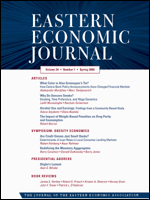
Eastern Economic Journal
Navigating the Complexities of Eastern Economic LandscapesThe Eastern Economic Journal, published by Palgrave Macmillan Ltd, serves as a significant platform for the dissemination of research in the field of economics and econometrics. With an ISSN of 0094-5056 and E-ISSN 1939-4632, this esteemed journal has been contributing to the academic community since its inception, covering a diverse range of economic topics with particular emphasis on issues pertinent to the Eastern economic landscape. As a respectable resource with a Q3 categorization in Economics and Econometrics, it ranks at #408 out of 716 in the Scopus database, representing a percentile of 43rd. Although it operates without an open access model, the journal's meticulous peer-review process ensures that only high-quality research is published, making it an invaluable resource for researchers, professionals, and students alike. With the scope of the journal evolving continuously, it encourages contributions that enrich the understanding of economic principles and foster discussions surrounding socioeconomic challenges.
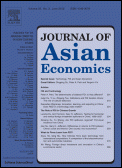
Journal of Asian Economics
Illuminating Economic Trends Across AsiaThe Journal of Asian Economics, published by Elsevier, serves as a pivotal platform for scholars and practitioners engaged in the comprehensive study of economic issues within Asia. With an ISSN of 1049-0078 and an E-ISSN of 1873-7927, this esteemed journal encompasses a wide array of topics in its scope, ranging from macroeconomic policy analysis to the intricacies of financial markets in the Asian context. Ranking in the Q2 category for both Economics and Econometrics and Finance, according to the 2023 metrics, it is positioned among the top-tier journals, currently holding a significant place at the 73rd percentile in Finance and 72nd percentile in Economics. This journal not only caters to academic researchers looking to publish their findings but also serves as an essential resource for professionals and students seeking to deepen their understanding of the dynamic economic landscape in Asia. By bridging empirical research and practical insights, the Journal of Asian Economics plays a crucial role in advancing knowledge and encouraging discourse in the field.
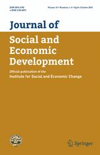
Journal of Social and Economic Development
Bridging Theory and Practice for Global ImpactJournal of Social and Economic Development serves as a crucial platform for the dissemination of pioneering research in the fields of social sciences and economics. Published by SPRINGER INDIA, this journal has established itself as an influential resource, demonstrating a commendable Q2 ranking in fields such as Economics, Econometrics, and Finance, alongside notable standings in Education and broader social sciences categories. With an ISSN of 0972-5792 and an E-ISSN of 2199-6873, the journal has been pivotal in bridging theoretical insights with practical applications, making it indispensable for researchers, professionals, and students alike. Despite its varied scope, the journal exemplifies a commitment to advancing knowledge and facilitating interdisciplinary dialogue, particularly in the context of global social and economic challenges. The journal's impact is further evidenced by its Scopus rankings, placing it within the top percentiles for social sciences and economics. As an Open Access journal, it enhances accessibility for a diverse audience, thereby facilitating a wider reach for scholarly discourse and research output.
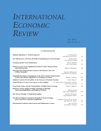
INTERNATIONAL ECONOMIC REVIEW
Fostering scholarly dialogue in economics and econometrics.INTERNATIONAL ECONOMIC REVIEW is a prestigious journal dedicated to advancing knowledge in the fields of economics and econometrics. Published by Wiley in the United Kingdom, this journal boasts an impressive Q1 ranking in the 2023 category of Economics and Econometrics, reflecting its significant impact in the academic community. With a continued publication since its inception in 1979, it offers a platform for rigorous scholarly articles that address contemporary issues, theoretical developments, and empirical findings in economics. Although it does not currently offer open access options, the journal maintains broad accessibility through institutional subscriptions. Researchers, professionals, and students are encouraged to contribute to and engage with this leading publication to foster knowledge exchange and stimulate scholarly dialogue in economic research. With its commitment to high-quality scholarship, the INTERNATIONAL ECONOMIC REVIEW remains a vital resource for developing insights that inform both policy and practice.

Gospodarka Narodowa-The Polish Journal of Economics
Empowering knowledge through critical economic analysis.Gospodarka Narodowa - The Polish Journal of Economics is a prestigious, peer-reviewed journal dedicated to advancing knowledge in the field of economics. Published by SZKOLA GLOWNA HANDLOWA, KOLEGIUM ANALIZ EKONOMICZNYCH, this journal has been an essential resource since its inception in 2000, providing open access to its valuable research findings to foster academic collaboration and accessibility. With a focus on contemporary economic issues, policies, and trends, the journal serves as a crucial platform for scholars, practitioners, and students alike to explore innovative economic theories and applications, both within Poland and globally. By promoting critical analysis and empirical research, Gospodarka Narodowa contributes significantly to the discourse in economic science, making it a vital resource for anyone interested in this dynamic field.